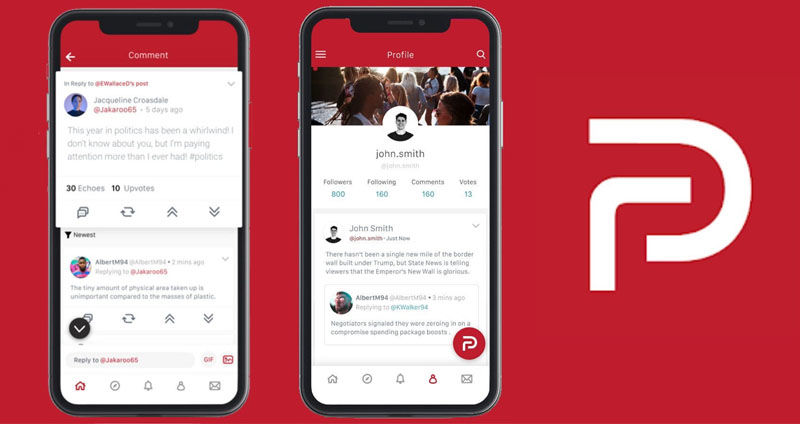The relaunch of the social media platform Parler has sparked a renewed debate about the role of right-wing voices in the digital sphere.
After being temporarily taken offline in the wake of the Jan. 6 insurrection, the platform is now gearing up for a comeback ahead of next year’s presidential elections.
The new owners of the company, a limited liability corporation known as PDS Partners, have announced their intention to bring Parler back to its roots as a marketplace of ideas.
The announcement of Parler’s relaunch has reignited discussions about the role of social media in shaping public discourse.
As a platform that has catered to right-wing voices, Parler has been at the center of controversies surrounding free speech, hate speech, and the spread of misinformation.
Its temporary shutdown in the aftermath of the Jan. 6 insurrection raised questions about the platform’s responsibility in curbing violent and extremist content.
The new owners of Parler have emphasized their commitment to promoting a “powerful resurgence” that prioritizes the exchange of diverse ideas.
This focus on a marketplace of ideas reflects a broader conversation about the role of social media in facilitating open and inclusive dialogue.
In an era marked by polarization and echo chambers, the relaunch of Parler raises important questions about the responsibility of social media platforms in fostering constructive and respectful discourse.
The relaunch of Parler also comes at a time of heightened scrutiny of digital media conglomerates and their impact on public discourse.
The purchase of Parler by the digital media conglomerate Starboard, and subsequently by PDS Partners, underscores the growing influence of these entities in shaping the online landscape.
As social media platforms continue to play a significant role in shaping public opinion and political discourse, the relaunch of Parler raises important questions about the concentration of power in the hands of a few corporate entities.
Furthermore, the failed attempt by Ye, the rapper formerly known as Kanye West, to purchase Parler highlights the intersection of celebrity influence and corporate ownership in the digital sphere.
The involvement of high-profile individuals in the ownership and management of social media platforms underscores the complex interplay between celebrity, influence, and the public sphere.

The failed agreement with Ye also raises questions about the role of individual personalities in shaping the direction of digital platforms and the potential impact on public discourse.
In conclusion, the relaunch of Parler ahead of next year’s presidential elections has reignited important discussions about the role of social media in shaping public discourse.
The platform’s emphasis on a “powerful resurgence” and a return to its roots as a marketplace of ideas reflects broader conversations about the responsibility of social media platforms in fostering open and inclusive dialogue.
The involvement of digital media conglomerates and high-profile individuals in the ownership and management of Parler underscores the complex interplay between corporate influence, celebrity, and public discourse.
As Parler prepares to make its comeback, it is crucial to consider the broader implications of its relaunch on the digital landscape and the shaping of public opinion.
The recent announcement of Elise Pierotti’s return as the chief marketing officer of Parler has sparked significant interest and speculation within the tech and social media industries.
It has been revealed that Pierotti will be part of a newly formed team at Parler, known as the Parler Development Studio (PDS), which also includes the platform’s new CEO, Ryan Rhodes, and several other individuals who have chosen to remain anonymous.
Additionally, it has been disclosed that Jaco Booyens, a prominent anti-sex trafficking activist, will be taking on the role of chief strategy officer within the organization.
Despite the attention surrounding these developments, the specific details and terms of the deal have not been publicly disclosed by Pierotti or any other representatives of Parler.
However, it has been confirmed that the deal was finalized just last week, and there are high expectations for the platform to relaunch in the first quarter of the upcoming year.
Parler, a social media platform that has positioned itself as a proponent of free speech, has historically catered to a relatively niche user base, particularly among right-wing and libertarian-focused individuals.
Despite its smaller user base in comparison to other mainstream social media platforms, Parler has garnered attention for its commitment to providing a space for uncensored and unrestricted discourse.
The return of Elise Pierotti and the formation of PDS at Parler have raised questions and generated curiosity about the future direction and potential changes that may occur within the platform.
The addition of Ryan Rhodes as the new CEO, along with the involvement of other undisclosed individuals, suggests that there may be significant shifts in the platform’s leadership and strategic direction.

Furthermore, the appointment of Jaco Booyens as the chief strategy officer is indicative of Parler’s commitment to addressing critical social issues, such as combatting sex trafficking.
Booyens’ background as an anti-sex trafficking activist brings a unique perspective and expertise to the platform, signaling a potential expansion of Parler’s focus beyond its traditional emphasis on free speech.
As the tech and social media landscape continues to evolve, the reemergence of Parler under the leadership of Elise Pierotti and the newly formed PDS presents an intriguing narrative within the industry.
The platform’s ability to attract and retain users, particularly in the wake of heightened scrutiny and competition, will undoubtedly be a focal point of interest and analysis in the coming months.
The upcoming relaunch of Parler in the first quarter of next year will be closely monitored by industry observers and stakeholders, as it represents a pivotal moment for the platform to redefine its identity and position within the broader social media ecosystem.
The strategic decisions and initiatives implemented by the new leadership team, including Elise Pierotti, Ryan Rhodes, and Jaco Booyens, will undoubtedly shape the trajectory and future prospects of Parler.
In conclusion, the return of Elise Pierotti as the chief marketing officer, the formation of PDS, and the appointment of Jaco Booyens as the chief strategy officer at Parler have ignited a sense of anticipation and speculation within the industry.
The dynamics and implications of these developments will undoubtedly be subject to close scrutiny and analysis as the platform prepares for its anticipated relaunch.
The future of Parler, under the stewardship of its new leadership team, remains a compelling and evolving narrative within the realm of social media and technology.
It is interesting to hear that Parler plans to relaunch early next year, especially after the challenges it faced in returning online following the removal of its web-hosting service by Amazon.
It is commendable that the platform is taking steps to distance itself from the events that led to its previous removal, and it is promising to hear that Parler will no longer be using Amazon’s cloud service AWS.
The decision to rely on other technology, such as a “hyper-scaled private cloud,” is a bold move and shows the platform’s commitment to reestablishing itself in a responsible and sustainable manner.
Additionally, the emphasis on implementing moderation services to combat issues related to inciting violence is a crucial step in ensuring a safe and respectful online environment.
The fact that Google and Apple had also removed Parler’s app from their online stores after the insurrection, but later allowed it to return, indicates that the platform has made significant efforts to address the concerns that led to its initial removal.

It is encouraging to see that Parler is taking the necessary measures to rebuild its reputation and regain the trust of both users and tech giants.
Overall, the decision to relaunch Parler with a focus on responsible and ethical practices is a positive development, and I hope to see the platform succeed in creating a safe and inclusive online community.
